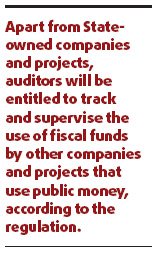Top Biz News
Government funds to get tighter audits
By Xie Yu (China Daily)
Updated: 2010-02-23 07:54
 |
Large Medium Small |
China plans to tighten the auditing of fiscal funds and all government-related construction projects, according to a newly-revised regulation, in a bid to ensure sound use of public money and effective prevention of corruption.
The regulation on the implementation of the Audit Law, issued over the weekend by the State Council and to take effect on May 1, will help improve the country's auditing system, experts say. It will also boost the supervision of areas with high incidences of corruption, such as construction projects.
Apart from State-owned companies and projects, auditors will be entitled to track and supervise the use of fiscal funds by other companies and projects that use public money, according to the regulation.

The regulation also makes it clear that construction projects in which government investment exceeds 50 percent, or those with less than 50 percent government investment but which have government control over construction and operation, must accept auditing.
Meanwhile, the limitations for publishing auditing results will be canceled after the revision, which means the transparency in auditing results will be enhanced in the future. But listed companies must be notified of audit results five days before the public announcement.
Mao Shoulong, public policy professor at Beijing-based Renmin University of China, said: "The track audit will be good for the legitimate and efficient use of public funds and will also provide clues for anti-corruption campaigns."
"The newly-revised regulation has increased the independence of the audit administration, while investigation into big cases currently still needs the involvement of the Party's discipline watchdog, which means sometimes the audit authority cannot react in time to prevent State assets from being embezzled or place the suspects under control," 21st Century Business Herald quoted an insider yesterday.
Lin Yueqin, a researcher with the Chinese Academy of Social Sciences, said it would be better if the auditing departments were granted more power in personnel appointment.
Under the current regulation, local governments have the power to dismiss the auditing head, though the decision should be agreed on by a superior auditing department.
Wang Yukai, a professor with the Chinese Academy of Governance, said the new regulation is more specific in tracking the use of fiscal funds and clarifying the construction projects that should accept auditing, which strengthens the "deterrence" for officials.
Over the past decade, a large amount of public funds have flowed into major construction projects nationwide in the wake of the country's booming economy and rapid development. But frequent cases of bribery and corruption have caused widespread public concern.
In the last two years, reconstruction funds for regions hit by the 2008 Sichuan earthquake and the 4 trillion yuan stimulus package to combat the global financial crisis have come under close public scrutiny, as both involve a large number of infrastructure and construction projects.
Premier Wen Jiabao and other senior leaders have urged auditors to work on any projects in the post-quake reconstruction as well as the stimulus package.
China's National Audit Office said in January that 230 million yuan ($33.7 million) of reconstruction funds have been misused.
A total of 88 cases involving 198 Party officials have been handled related to the misuse of the stimulus package money one year after its launch, an official with the CCDI said in December.
The regulation also specified auditors' power and strengthened internal supervision among audit organs of various levels, which are well recognized by experts.
"Good procedures are indispensable for a good auditing system," professor Mao said.
The current Audit Law took effect in June 2006, after being passed by the Standing Committee of the 10th National People's Congress.
Xinhua contributed to the story













